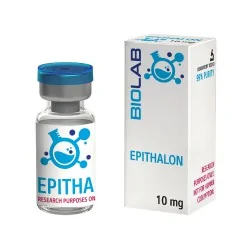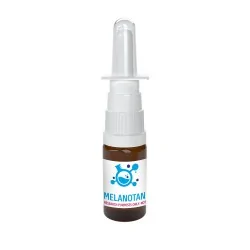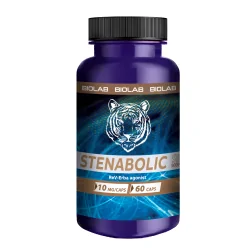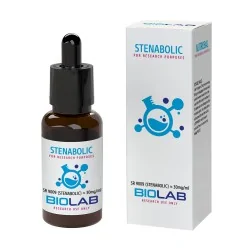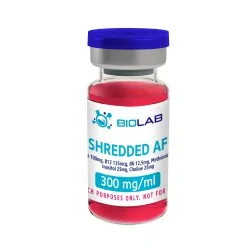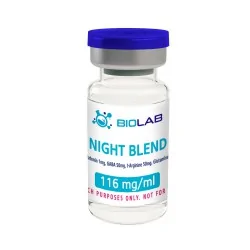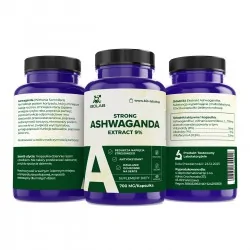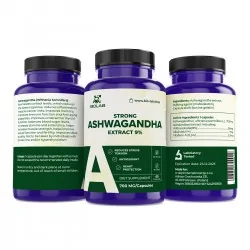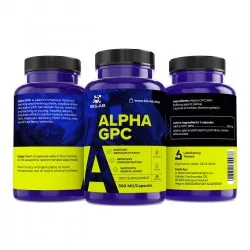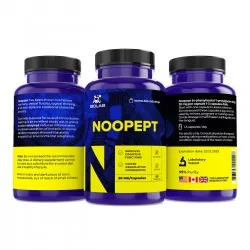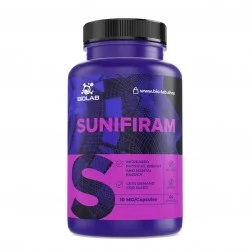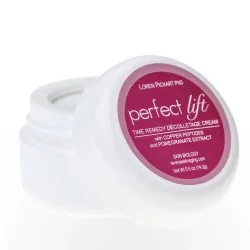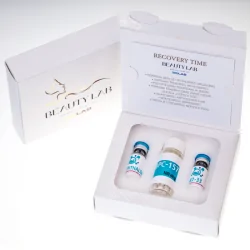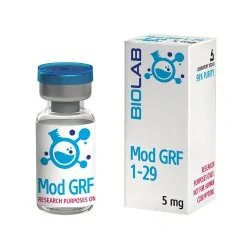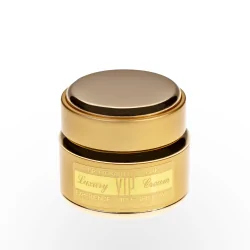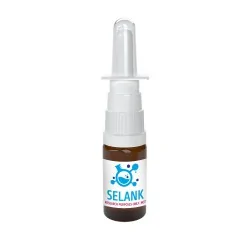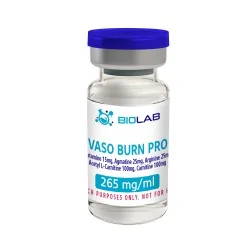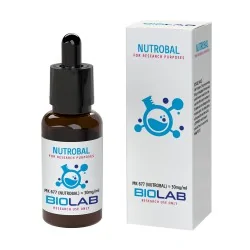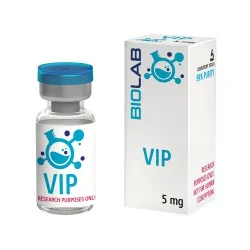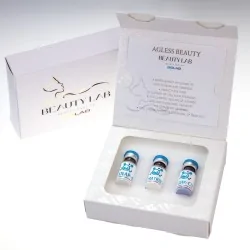-
Peptides
Peptides
back
-
- show all
-
-
Purpose
Return
- Peptides for bodybuilding
- Biomimetic peptides
- Peptides for the gym
- Peptides for bulk
- Natural peptides
- Peptides for joints
- Peptides for reduction
- Peptides for fat burning
- Peptides for weight loss
- Peptides for the muscles
- Peptides for regeneration
- Peptides for libido
- Peptides for injuries
- Peptides for athletes
- Peptides in tablets
- Peptides in injection
- Spray peptides
-
Type
Return
- BPC 157
- hgh
- ghk-cu
- ghrp-6
- ghrp-2
- grf
- tb-500
- oxytocin
- semax
- melanotan
- pt-141
- epithalon
- selank
- thymosin
- cjc-1295
- ipamorelin
- peg-mgf
- adamax
- kisspeptin
- dsip
- sermorelin
- n-acetyl
- arg-bpc
- thymalin
- 5-amino 1MQ
- alarelin
- mots-c
- igf-1 Lr3
- IGF DES
- GHRP2
- Fragment
- CJC DAC
- Adamax
- Cortagen
- Snap 8
- B7-33
- Melanotan 2
- Selank
- Thymosin alpha 1
- Mots
- VIP
- LL-37
- Livagen
- P-21
- KPV
- Ara 290
- L21
- Acth 1-39
- matrixyl
- TRH
- Larazotide acetate
- glp-1
- GC-1 SOBETIROME
- TB-4 FRAG+BPC-157 ARG
- AOD-9604
- cardiogen
- prostamax
- pancragen
- bronchogen
- retatrutide
- Thrombin peptide Tp508
- SLU-PP-332
- LIPOTROPIN
- THYMOGEN ALPHA-1
- Nutrobal
-
Purpose
Return
-
Peptide calculator
-
- show all
-
- Sarms Sarms back
-
- show all
-
Produkty
- Amino acids Amino acids back
-
- show all
-
Aminokwasy
-
- show all
-
Produkty
- Supplements Supplements back
-
- show all
-
Supplements
-
Purpose
Return
- Weight Loss Supplements
- Supplements for memory and concentration
- Energy supplements
- Hair and nail supplements
- Cholesterol supplements
- Supplements for the complexion and skin
- Sleep supplements
- Gym supplements
- Supplements for reduction and sculpture
- Eye and vision supplements
- Supplements for stress and nerves
- Supplements for regeneration and fatigue
- Strength and fitness supplements
- Joint supplements
- Liver supplements
- Acne Supplements
- Kidney supplements
- Knee supplements
- High blood pressure supplements
- Cellulite supplements
- Bone supplements
- Tendon supplements
- Supplements for potency and libido
- Dopamine supplements
- Serotonin supplements
-
Type
Return
- Ashwagandha
- Omega 3
- Vitamin D3
- Magnesium citrate
- N-Acetylcysteine
- Biotin
- Collagen
- L-Theanine
- 5-Hydroxytryptophan
- Forskolin
- Resveratrol
- Coenzyme Q10
- PQQ
- Rhodiola rosea
- Canna
- Kava Kava
- TUDCA
- Cholinolytics
- berberys
- inozytol
- sodium butyrate
- lactoferrin
- selenium
- cordyceps
- Quercetin
- lions mane
- glycine
- curcumin
- alpha lipoic acid
- shilajt
- apigenin
- dim
- chasteberry
- baikal thyroid
- reishi
- pycnogenol
- phosphatidylserine
- chromium picolinate
- astragalus
- nad+
- tulsi
- egcg
- magnesium citrate
- nalt
- pana ginseng
- synephrine
- zinc picolinate
- cherry tart
- magnesium taurate
- magnesium l-threonate
- adaptogens Return
-
Purpose
Return
-
- show all
-
Produkty
- Nootropics Nootropics back
-
- show all
-
Nootropy
-
- show all
-
Produkty
- Beauty Beauty back
-
- show all
-
- Preparation Preparation back
-
- show all
-
- Pre-workouts
- Slimming preparations
- Preparations for the joints
- Acne preparations
- Preparations to strengthen the body
- Preparations for the sinuses
- Erection preparations
- Hair preparations
- Preparations for the liver
- Nail preparations
- Sleep preparations
- Intestinal preparations
- Circadian rhythm disorders
- Preparations for the heart
- Preparations for libido
- Preparations for malnutrition
- Preparations for sedation
- Preparations for strengthening
- Preparations for the kidneys
- Fat burning preparations
- Preparations to reduce appetite
- Preparations for growth
- Preparations for depression
- Preparations for energy
- Bone preparations
- Preparations for muscle mass
- Skin bronzing preparations
- Skin rejuvenating preparations
- Preparations for the condition
- Preparations for the work of the brain
- Anti-aging preparations
- Preparations for regeneration
- Growth hormone replacements
- Injury preparations
Biomimetic peptides
Showing 1-2 of 2 item(s)- Purpose
-
- Peptides for bodybuilding
- Biomimetic peptides
- Peptides for the gym
- Peptides for bulk
- Natural peptides
- Peptides for joints
- Peptides for reduction
- Peptides for fat burning
- Peptides for weight loss
- Peptides for the muscles
- Peptides for regeneration
- Peptides for libido
- Peptides for injuries
- Peptides for athletes
- Peptides in tablets
- Peptides in injection
- Spray peptides
Filter By
Price
Price
-
€37.00 - €79.00
Active filters
What are peptides?
Peptides are called organic compounds that make up proteins. Due to their function, peptides are also sometimes called modeling substances. Their basic elements are chains of amino acids, linked to each other by peptide bonds. It is thanks to them that individual organs or cells of the body can "communicate" with each other, regulating important body processes.
Unfortunately, with age and naturally occurring aging processes, the amount of peptides (as well as their synthesis itself) is reduced. The answer to these mechanisms are biomimetic peptides.
Biomimetic peptides - what are they?
Biomimetic peptides are produced synthetically in a laboratory setting, on the model of those naturally occurring in the human body, which is where their name comes from. This is because biomimeticism is the imitation of structures or processes from the natural world.
Making these types of peptides is a complex process, which also explains the rather high price of products containing them. At the same time, however, they are relatively efficient - biomimetic peptide, thanks to its specific structure, gives large effects even in small, precisely applied doses, hence their presence significantly increases the effectiveness of cosmetics.
Biomimetic peptides have found widespread use in aesthetic medicine and cosmetology as natural activators of the skin's defense mechanisms.
How do biomimetic peptides work?
It is difficult to point to a single trajectory of biomimetic peptides. First of all, because at this moment there are more than 300 of them, and secondly, because each shows different properties. For this reason, it is always necessary to select peptides according to individual skin needs. For example, they can stimulate skin regeneration, improve its repair mechanisms, renew collagen and elastin fibers or regulate melanogenesis. They also have strong antioxidant effects.
When it comes to biomimetic peptides, the effects our clients care about most often include:
- smoothing of facial skin,
- eliminating hyperpigmentation, dark circles or bruising,
- increasing skin firmness,
- diminish the appearance of wrinkles,
- reduce cellulite or fatty tissue,
- stop hair loss,
- rejuvenate the eye area.
They are also used to help treat acne, not just youthful acne - acne sometimes affects even after the age of 30. One of the peptides helpful for this condition is LZ-1.
Speaking of biomimetic peptides, the effect of they are natural and long-lasting, while being safe and - importantly for some - non-allergenic. They can be successfully used both on the face (e.g. by introducing biomimetic peptides under the eyes) and its surroundings, as well as on the entire body."
Biomimetic peptides in cosmetics
The use of biomimetic peptides in cosmetics was only a matter of time, and today they are a standard in many so-called beauty salons. A major advantage of peptide treatments is the short application time. Among the peptides from Biolabshop, you will find not only individual products, but also ready-made sets, such as Women's set - Glow To The Show.
In the case of biomimetic peptides, however, it is exceptionally important to administer them properly, as large peptide molecules themselves cannot penetrate the top layer of the epidermis. Currently, among the various forms of biomimetic peptide administration, needle mesotherapy gives the best results.
Biomimetic peptides can also be applied through needle-free mesotherapy or ionophoresis.
What types of biomimetic peptides are used in cosmetology?
There are 3 basic types of biomimetic peptides - each plays a slightly different role and each can be successfully used in aesthetic treatments or as an ingredient in cosmetics.
- signal peptides - these are usually simply fragments of collagen or elastin, and their role is to initiate processes within cells,
- transporting peptides - water-soluble dipeptides and tripeptides that transport compounds or ions important in the body's metabolic processes, but also, for example. wound healing,
- inhibitors of neurotransmitters - such as agrigrelin (created as an alternative to botulinum toxin) or botox, in cosmetology used as popular wrinkle fillers.
Newsletter
SIGN UP AND STAY UP TO DATE!
We specialize in wholesale and retail supply of high quality peptides.
((modalTitle))
((confirmMessage))
((title))
- Preparation Preparation back
- Beauty Beauty back
- Nootropics Nootropics back
- Supplements Supplements back
- Amino acids Amino acids back
- Sarms Sarms back
-

